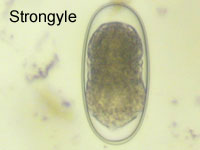This is the most common type of egg found in the fecal sample. There are two main types, “large” and “small”. All Strongyles start out as eggs scattered throughout the environment (feces, soil, etc.) which hatch into larvae that are consumed by horses as they graze or drink infected water. The larvae mature in the intestinal tract. The “large” Strongyles migrate into either the blood vessels of the intestines or migrate into the liver. “Small” Strongyles stay within the intestines and burrow (encyst) within the wall of the large intestine. Here they can stay for months or years before the proper conditions trigger them to emerge. While Strongyles are in this stage, they are not shedding eggs and are not impacted by dewormers but are doing the most damage to the horse. The “large” Strongyles can cause severe or even fatal colic or blood vessel ruptures as well as weight loss, anemia or colic and the encysted “small” Strongyles can severely damage the walls of the intestines.
Sooner or later, all Strongyles migrate back to the intestines and adhere to the inner walls. This is when the worms are the least damaging to the horse. This is also when the worms shed their eggs which we find in their feces. All Strongyle eggs look exactly alike, so the parasitologist cannot distinguish a “small” Strongyle from a “large” Strongyle egg.

